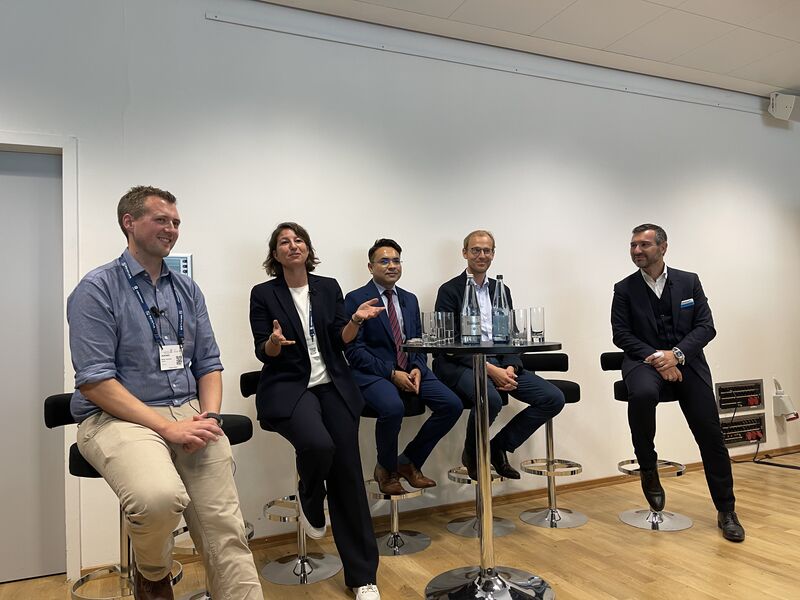The accelerating digitalisation and increasing connectivity of shipping is seeing vessels transform into floating offices and homes, with benefits at both the commercial and crew welfare level.
This year’s edition of SMM Hamburg saw Inmarsat Maritime host a seminar on Business value of maritime digitalisation – Harnessing the power of AI, IoT, and connectivity for digital efficiency and growth.
In a session in which change and progress were core themes, participants focused on the way advancements in digital technologies, connectivity, and innovation are reshaping the way the maritime industry can operate, optimise and grow.
Emphasising the current pace of change in shipping, Pankaj Sharma, Head of Performance Optimisation Control Room, Columbia Shipmanagement, recalled a forum he had joined six years previously in which panellists discussed whether digitalisation was the future of the industry or merely a buzzword.
“Now, we talk about digitalisation as a necessity,” he noted. “That time, I also said that connectivity would be the enabler for this industry to embrace digitalisation, and that is exactly what is happening.”
Columbia Shipmanagement leverages connectivity to extract real-time data from shipboard systems and use it in conjunction with advanced technologies such as digital twins and virtual reality. In this way, Sharma explained, technicians on shore benefit from three-dimensional, 360-degree live images when assisting onboard engineers with maintenance and repair tasks.
Marty Cochrane, CEO of CEATAEC, a Wilhelmsen Group Company, is similarly enthusiastic about the power of modern maritime connectivity. Of particular value, he said, is the ability to operate vessels in a “sassier” way, rolling out updates more efficiently, collecting data, and ultimately transforming ships from “old floating assets into something connected to offices”.
The growing connection between ship and shore is a recurring topic at maritime fora today, and many industry stakeholders, including Inmarsat Maritime, regard the modern vessel as a ‘floating office’. Marco Camporeale, Inmarsat Maritime’s Vice President for Strategy and Business Development, described the main driver of the floating office concept as “always-on” cloud infrastructure offering a “guaranteed level of connectivity” and a “seamless experience”.
These features enable digitalised, artificial intelligence-based processes that enhance the level of support available to crew and reduce their administrative workload, meaning they “don’t have to deal with just another piece of reporting software”, said Cochrane. Yet the modern vessel also represents a “floating home”, and the need to keep crew entertained and connected to their families is another “strong driver” of digitalisation according to Camporeale.
Alongside crew welfare, another top-of-mind concern for maritime organisations is customer satisfaction. Donya-Florence Amer, Member of the Executive Board and CIO?CHRO at Hapag-Lloyd AG, explained that the shipping company’s digitalisation strategy is focused primarily on augmenting the client experience.
“We are leveraging technology and data to transform our operations and make them more efficient,” she said. “It’s all about how you can move a container from A to B on time, in good condition, and in a way that is profitable for the customer and the shipping company.”
As part of these efforts, Hapag-Lloyd is in the process of fitting 1.8 million IoT devices to its containers to optimise cargo tracking. These devices, Amer explained, send a “ping” every 11 minutes, updating the company and its clients on the location of their containers. Ultimately, Hapag-Lloyd aims to cut this interval to three minutes and thereby provide its customers with more current information on the status of their cargo.
For many shipping companies, commercial factors are a key driver for embracing digitalisation. For others, however, a lack of clarity surrounding return on investment gives cause for hesitancy. Matthias Bloete, Director, Controlling & Corporate Development at Peter Döhle Schiffahrts-KG, explained that ROI is not the main deciding factor for investing in new technologies and urged organisations to consider more than just financial aspects.
“Predicting the rate of return and assessing the value of new technologies is difficult, and cash flow is at risk,” he acknowledged. “When only looking at financial KPIs, you would probably come to the conclusion not to invest – but this would prevent innovation in your organisation, so you have to look at different angles.”
Bloete explained that, when making investment decisions, Peter Döhle Schiffahrts considers whether a new technology addresses a problem facing the company, its competitors, and its customers – and whether there is a team capable of leveraging that technology. “Financial KPIs are important, but even more important are the soft factors of ‘team’ and ‘market opportunity’.”
While shipping companies may benefit from taking risks when investing in new technology, there can be no room for incaution in matters of cyber-security, the speakers agreed.
This is an area in which Inmarsat’s NexusWave, its new fully managed connectivity service, excels, commented Camporeale. “NexusWave takes the traffic from all underlay networks – whether GEO, LEO, or LTE – through our own ground military-grade infrastructure.” On board the ship, he said, Unified Threat Management application adds additional protection, while segregation of corporate, operational technology, and crew networks minimises risk further.
In addition to its ‘secure by design’ infrastructure, NexusWave provides seamless, high speed, reliable, always-on connectivity with unlimited data for both corporate and crew requirements, making it an invaluable tool for enabling the floating office and home, concluded Camporeale.
You can watch the full seminar here

 Join The Club
Join The Club











